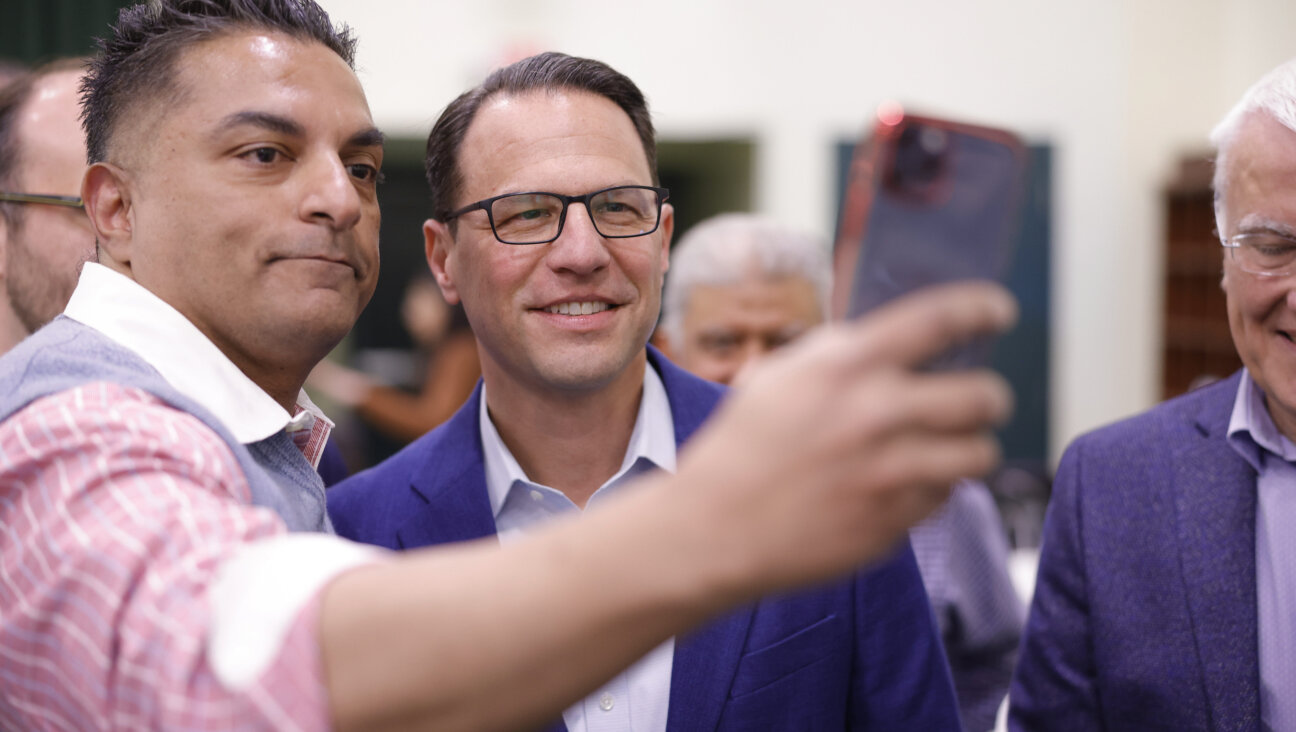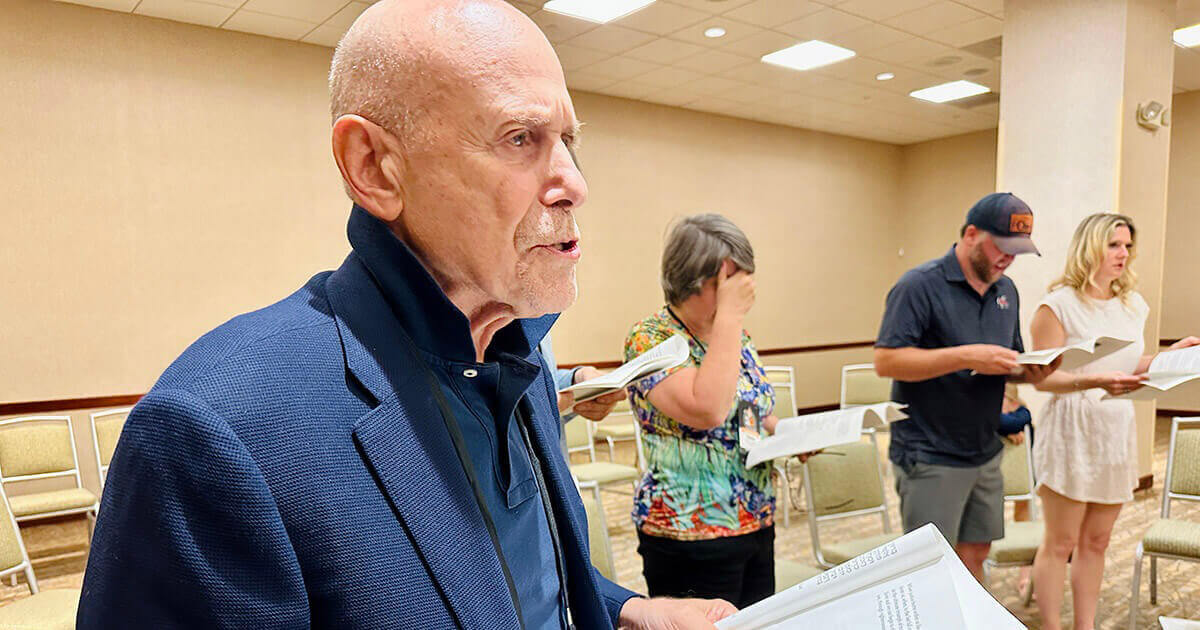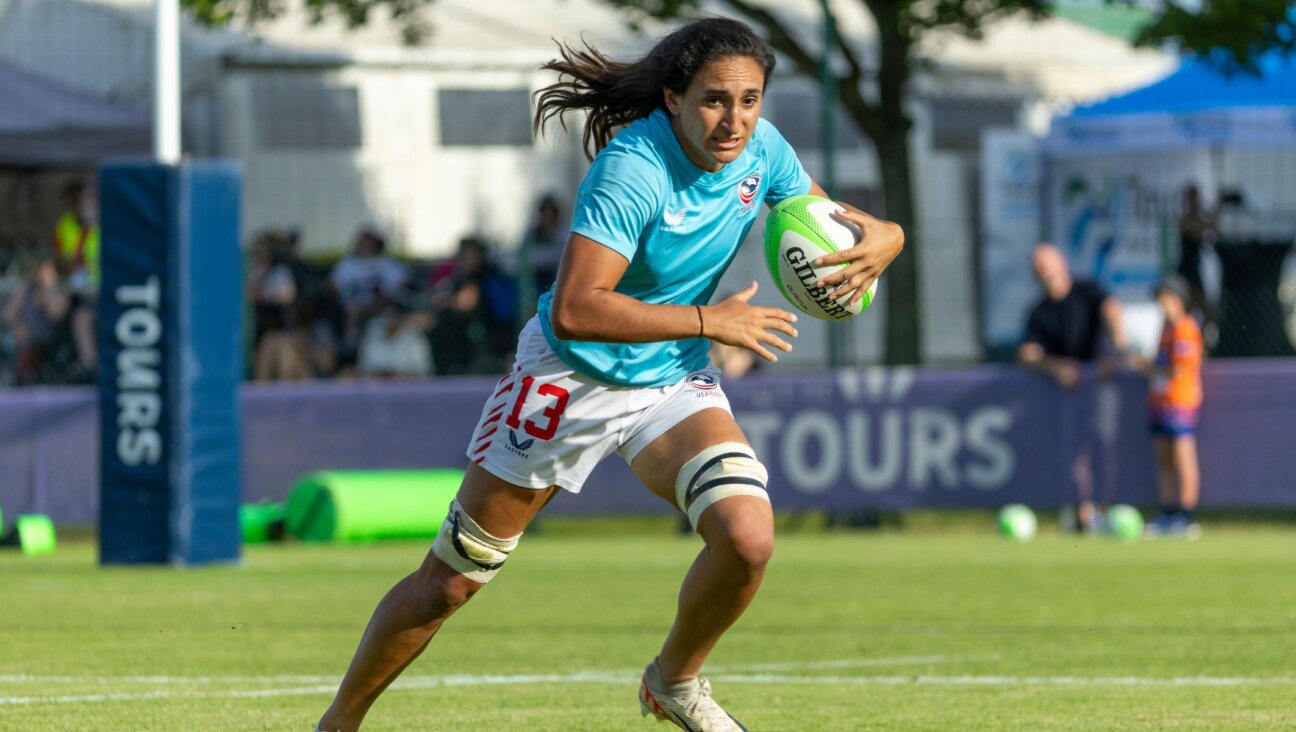Here is baseball’s all-star all-Jewish lineup of all time

Ian Kinsler Image by Patrick Smith/Getty Images
As Major League Baseball opens, here’s a question for a certain type of avid sports fan: Who would play on the ultimate all-star Jewish baseball team?
The choices are surprisingly vast. Over the past decade, an average of 14 Jews have played on Major League Baseball teams each year. That is more than in any decade since 1901.
In last year’s COVID-shortened season, 13 Jewish players — Ryan Braun, Alex Bregman, Garret Stubbs, Ryan Lavarnway, Joc Pederson, Kevin Pillar, Rowdy Tellez, Richard Bleier, Max Fried, Rob Kaminsky, Dean Kremer, Ryan Sherriff, and Robert Stock — donned big league uniforms.
These 13 Jewish ballplayers represent 1% of the 1292 athletes who played on big league rosters last season. Jews constitute about 2.2% of the U.S. population.
Not all of last year’s big-league Jews will be back in the majors this season. Four other Jews who played in spring training this year — Hunter Bishop, Sam Delaplane, Jake Fishman, and Kenny Rosenberg — probably won’t be on Opening Day rosters but may be called up later in the year.
The truth is, Jews have long had a love affair with baseball. In 1903, the Forward published a letter from a Russian immigrant.
“What is the point of a crazy game like baseball?” the reader wanted to know. “I want my boy to grow up to be a mensch, not a wild American runner.”
“Let your boys play baseball and play it well,” Forward editor Abraham Cahan responded in the letters-to-the-editor column, Bintel Brief. “Let us not raise the children that they grow up foreigners in their own birthplace.”
As millions of immigrants came to America in the early 1900s, the country became a cauldron of nativist and antisemitic vitriol. Antisemitism was directed at players as well as the handful of Jews who owned major and minor league teams.
It was exacerbated by the role that Jewish gamblers played in the infamous 1919 “Black Sox” scandal, when the Chicago White Sox threw the World Series to the Cincinnati Reds. The next year, industrialist and auto magnate Henry Ford, a vicious antisemite, wrote, “If fans wish to know the trouble with American baseball, they have it in three words — too much Jew.”
It is impossible to know how many Jews have played in the majors because, in the first third of the 20th century, so many of them changed their names. During that early period, at least five players named Cohen played in the big leagues, but only one of them (New York Giants star Andy Cohen) used his birth name. Samuel Cohen, for example, played second base in the major leagues from 1916 to 1926 under the name Samuel Arthur Bohne.
Lipman Pike, the first professional baseball player, was born in New York in 1845 to Dutch Jewish parents. Pike began playing baseball soon after his Bar Mitzvah, and in 1866, at the age of 21, agreed to play for the Philadelphia Athletics for $20 a week. That year he belted six home runs in one game, establishing his reputation as America’s first great slugger. Pike played for several professional teams until he retired in 1881 with a lifetime .322 batting average. Upon his retirement, Pike took over his father’s Brooklyn haberdashery shop and ran it until dying of heart disease at the age of 48 in 1893.
The National League (NL) began operation in 1876, joined by the American League (AL) in 1901, the year considered the start of what is now known as Major League Baseball.
Pike was one of six Jews who played pro ball before 1901. Since then, 173 Jews have played in the majors out of the 17,965 athletes in the big leagues, according to information compiled by Jewish Baseball News. Jews have thus comprised about 1% of all big league players – less than half of Jews’ proportion of the American population (about 2.5%) during the past 120 years.
The peak of Jewish participation in major league baseball, as a proportion of all players, occurred in 1937, 1938, and 1951, when Jews represented 2% of all players. Back then, the big leagues had just 16 teams (compared with 30 today) and far fewer players.
In the early- and mid-1900s, most Jewish big leaguers were the children of immigrants who learned to play in city playgrounds and parks. Only three Jewish players – William Christell (1875-1939), Reuben Ewing (1899-1970), and Izzy Goldstein (1908-1993) – were born in Eastern Europe. Interestingly, each of them was born in Odessa, Russia.
By the late 1900s, most major league Jews were two or three generations removed from the immigrant generation. Today, most Jewish players are the offspring of inter-married couples, where only one parent is Jewish. That was taboo during most of the 1900s, but it is much more widely-accepted in this century.
Who are the greatest Jewish ballplayers of all time? These are the members of the All-Time Jewish All-Star team.

Hank Greenberg Photo by Transcendental Graphics/Getty Images
First base: Hank Greenberg (1911-1986) was the first Jewish baseball superstar. Playing between 1930 and 1947 (interrupted by the equivalent of four full seasons during his World War 2 service), Greenberg hit 331 homers, had a slugging average of .605 and batted .313. He led the AL in homers and RBIs four times. He had more than 100 RBIs in seven seasons, including an astounding 183 in 1937. Greenberg played in three World Series, was a five-time All-Star, and was the AL’s Most Valuable Player in 1935 and 1940.
During his playing career, the 6-foot-4 Greenberg — who hit 58 home runs in 1938, two short of Babe Ruth’s 1927 record — faced antisemitic slurs and occasionally challenged bigots to fight him one-on-one. He often said that he felt every home run he hit was a home run against Hitler.
On September 18, 1934, when Greenberg was leading the AL in RBIs and his Detroit Tigers were in a close battle for first place, he chose to attend Yom Kippur services rather than play. When he arrived at the synagogue, the congregation gave him a standing ovation.
In 1935, when the previous year’s pennant-winning managers selected the All-Star teams, Greenberg’s own skipper, Mickey Cochrane, didn’t pick him even though he already had 103 RBIs at the All-Star break, a record that still stands. (Cochrane picked Lou Gehrig and Jimmy Foxx as the All-Star first basemen.)
During the 1935 World Series, umpire George Moriarty warned the Chicago Cubs players to stop hurling antisemitic insults at Greenberg. By the time the game was over, Moriarty had cleared much of the Cubs’ dugout. Kenesaw Mountain Landis, baseball’s racist commissioner, disciplined and fined Moriarty for his actions, but did not discipline the bigoted players.
The Bronx native was inducted into the Baseball Hall of Fame in 1956 – one of two Jewish players (along with Sandy Koufax) with a plaque in the Cooperstown shrine.

Ian Kinsler Image by Patrick Smith/Getty Images
Second base: Born in 1982 to a Jewish father and a Catholic mother, Ian Kinsler played for Arizona State University and the University of Missouri before signing with the Texas Rangers. During his 14 year Major League career, Kinsler recorded 1,999 career hits, batting .269 with 257 homers, 1,243 runs scored and 243 stolen bases playing for the Rangers, Tigers, Angels, Red Sox and Padres.
He was selected to the All-Star team four times (2008, 2010, 2012, and 2014), won the Golden Glove (as best-fielding second baseman) in 2016 and 2018, and was a member of the 2018 World Series champion Boston Red Sox.
He is one of only 41 players in baseball history to join the 30/30 club — to hit at least 30 homers and steal 30 bases — and one of only 12 players who did it twice (in 2009 and 2011). In 2017, Kinsler played for the USA team that captured their first World Baseball Classic championship.
Kinsler retired after the 2019 season and the following year obtained Israeli citizenship in order to qualify to play with Israel’s baseball team in the 2020 summer Olympics in Tokyo which, due to the COVID-19 pandemic, were rescheduled for 2021. If the Israeli teams wins the gold medal, Kinsler will be the first player in baseball history to win the Olympics, the World Series, and World Baseball Classic.

Alex Bregman Image by Ezra Shaw/Getty Images
Shortstop: In his bar mitzvah speech, Alex Bregman, then 5’4”, said: “I want to be a professional athlete who plays for the love of the game, never quits trying to give my best, and is a good role model for all of the kids who look up to baseball players.”
While a student at Louisiana State University, Bregman (born in 1994) was voted 2013 National Freshman of the Year by Baseball America and was a two-time All-American. At the end of his junior year in 2015, the Houston Astros selected Bregman as the second pick in the first round of the baseball draft.
He has spent his entire five-year career with the Astros, playing both shortstop and third base. In 2017 he was the youngest member of the USA team that won the World Baseball Classic goal medal. That year he was also the starting second baseman for the Astros, who won the World Series. In 2018 Bregman not only made the All-Star team but was also named MVP of the All-Star game after hitting a go-ahead home run in the 10th inning. He led the AL in doubles with 51. The following year he made the All-Star team again, led the NL in walks (119), and received the AL’s Silver Slugger Award as the best offensive third baseman. In his career so far he’s averaged 30 home runs and 99 RBIs per season while hitting .283.

Al Rosen Image by Hy Peskin/Getty Images
Third base: Al Rosen (1924-2015) dropped out of the University of Florida in 1942 to play minor league baseball, spent four years in the military during World War 2, and joined the Cleveland Indians in 1947.
In 1950, his first full season, he set an AL record for most homers (37) by a rookie, a milestone that wasn’t broken until 1987 by Mark McGwire. Rosen spent his entire 10-year playing career with the Indians, winning the AL MVP award in 1953, when he led the league in homers (43), RBIs (145), runs (115), total bases (367) and slugging (.613), and finished second in batting average by less than one percentage point.
Selected for the All-Star team four consecutive years (1952-1955), Rosen twice led the league in homers and RBIs. He was a .285 career hitter, with 192 home runs and 717 RBIs in 1,044 games. After retiring in 1956 Rosen became a stockbroker for 22 years before returning to baseball as the President/CEO of the Yankees (1978-79), President/CEO of the Astros (1980-85), and president and general manager of the Giants (1985-92).

Shawn Green Image by Stephen Dunn/Getty Images
Outfield: During his 15-year career (1993-2007) with the Blue Jays, Dodgers, Diamondbacks and Mets, Shawn Green (born in 1972) swatted 328 homers, accumulated 1,070 RBIs and hit .283. He made the 1999 (NL) and 2002 (AL) All-Star teams and won the Golden Glove award for fielding in 1999.
He hit more than 42 homers three times (with 49 in 2001) and batted in more than 100 runs in four seasons. In 1999, he led the AL in doubles, extra base hits and total bases. On May 23, 2002, playing with the Dodgers against the Milwaukee Brewers, Green hit four home runs (tying the Major League record), a double and a single (going 6 for 6), setting a record (19) for most total bases.
In 2001, Green ended a streak of 415 consecutive games played when he sat out on Yom Kippur. “I think it’s important as a Jewish athlete to set an example for kids, even kids who are not Jewish, to show them that there are certain priorities in life,” Green said at the time. “Baseball has been a huge part of my life. To put my religion before it I feel is a good example to set. Whether we like it or not, we as athletes are role models.”
Three years later, as the Dodgers’ leading hitter, Green missed the Dodgers game against the Giants on Yom Kippur even though his team was in the middle of a tight race.

Ryan Braun Image by Dilip Vishwanat/Getty Images
Outfield: Ryan Braun (born 1983) is the son of a Jewish father (who immigrated from Israel to the United States at age 7) and a Catholic mother. Braun, who grew up in Mission Hills, a Los Angeles suburb, at one point lived with his maternal grandfather in a house that once belonged to Hank Greenberg.
Braun was a two-time All-American at the University of Miami and was named National Freshman of the Year by Baseball America in 2003. The Milwaukee Brewers drafted him in the first round (fifth overall) in the 2005 draft. In 2007, he was the first Jew to win Rookie of the Year honors, hitting .324 with a league-leading .634 slugging average. He was the NL’s MVP in 2011 and an All-Star every year between 2008 and 2012 and again in 2015. In his 14 seasons in the big leagues, all with the Brewers, he hit 352 home runs (an average of 32 per 162-game season), with 1153 RBIs (an average of 106 a season), with 216 stolen bases (20 per season). At the end of the 2020 season, he had a lifetime batting average of .296. In different seasons he led the NL in hits, runs, home runs and (twice) slugging average.

Sid Gordon Image by wikipedia
Outfield: The son of Russian immigrants, Brooklyn-born slugger Sid Gordon (1917-1975) joined the New York Giants in 1941 from Long Island University and played outfield, first base, second base and third base over 13 seasons with the Giants, Boston and Milwaukee Braves, and Pittsburgh Pirates until he retired in 1955. He slammed 202 home runs and batted .283.
He hit 25 or more homers in five seasons and had more than 100 RBIs three times, and was picked for the 1948 and 1949 All-Star teams. In Gordon’s first Major League game, on September 11, 1941, the Giants put four Jewish players on the field, including outfielder Morrie Arnovich, pitcher Harry Feldman, catcher Harry Danning and Gordon. Gordon spent two years (1944 and 1945) in the Coast Guard during World War 2 during the prime of his baseball career.

Harry Danning Image by Sports Studio Photos/Getty Images
Catcher: Harry (“the Horse”) Danning (1911-2004), born to immigrant parents in Los Angeles, played his entire career (1933-41) with the New York Giants. His playing years were cut short when he entered military service during World War 2 and quit baseball at age 30. In 890 games, with 2,971 at bats, he hit .285, played in two World Series (1936 and 1937) and was selected to the NL All-Star team four consecutive years (1938-1941). On June 15, 1940, Danning hit for the cycle, including an inside-the-park homer. His best season was 1939, when he hit .313 with 16 homers and 74 RBIs. Danning led NL catchers in putouts three times and in base runners caught stealing twice. In 1934, while the Giants were in spring training in Florida, a hotel refused entry to Danning and another Jewish player, Phil Weintraub. After Giants manager Bill Terry threatened to move the World Series champion team to another hotel, the management relented.

Sandy Koufax Image by Getty Images
Pitcher: Many baseball experts consider Sandy Koufax the greatest pitcher of all time.
Born in Brooklyn in 1935, the left-handed Koufax was a better basketball player than baseball player at Lafayette High and then at the University of Cincinnati. Because he was signed (for $4,000) as a “bonus baby,” the Brooklyn Dodgers had to put him on their roster before he was ready for the majors.
Joining the team in 1955, Koufax’s first five years were plagued by wildness. In 1961, three years after the team had moved to Los Angeles, catcher Norm Sherry (a fellow Jew) urged Koufax to take something off his fastball. His control dramatically improved and Koufax became the game’s premier pitcher from 1961 through 1966, when arthritis in his left elbow ended his career prematurely at age 30.
During his career, he won 165 games and lost only 87. Despite his short career, he had 2,396 strikeouts. He was selected the NL’s MVP in 1963. He won the Cy Young Award as the game’s outstanding pitcher, unanimously in 1963, 1965, and 1966 when the honor was for all of baseball, not just one league. In those three years, Koufax led all major league pitchers in wins, strikeouts and earned run average.
In 1963, he won 25 games (and lost only five), struck out 306 batters, had an ERA of 1.88, threw 11 shutouts (still a record for left-handers) and led the Dodgers to a four-game World Series sweep over the Yankees. Over his career, he hurled four no-hitters, including a perfect game against the Chicago Cubs in 1965. In 1972, Koufax (then 36), was the youngest player ever elected to the Hall of Fame.
When Koufax decided to skip the Dodgers’ first game of the World Series against the Minnesota Twins, on Oct. 8, 1965, which fell on Yom Kippur, his decision made headlines and sparked controversy around the country. But he also became a source of great pride among American Jews. In his 1966 autobiography, Koufax wrote: “There was never any decision to make … because there was never any possibility that I would pitch … the club knows that I don’t work that day.”
On Sept. 25, 1966, one day after Yom Kippur, Koufax lost a 2-1 game to the Cubs’ Ken Holtzman, the next standout Jewish Major League pitcher. Both players had refused to pitch on the Jewish holy day.
Had we expanded the All-Time All-Star Jewish roster to include backup players, we could have added such outstanding athletes as pitchers Steve Stone (the 1980 Cy Young Award winner with a 25-7 record), Holtzman (who threw two no-hitters and was a two-time All-Star), Barney Pelty (with a career 2.63 ERA) and Erskine Mayer (who had 91 wins and only 70 losses, with a career 2.96 ERA, between 1912 and 1919), three-time All-Star Kevin Youkilis, two-time All-Star catcher Mike Lieberthal, Ron Blomberg (the No. 1 pick in the 1967 amateur draft, MLB’s first-ever designated hitter in 1973 and a career .293 hitter), and slugging outfielder Mike Epstein.
Jewish Baseball News considers a player to be Jewish if he has a Jewish parent or converted to Judaism, does not practice another faith, and is willing to be identified as a Jew. Some lists of Jewish players claim the great Hall of Fame Cleveland Indians shortstop Lou Boudreau, but although he had a Jewish mother, he was a Christian and did not identify as a Jew.
Similarly, Charles Solomon (Buddy) Myer, who played for 17 years with the Washington Senators, won a batting title, and was a two-time All Star – and is probably the best player in baseball history who is not in the Hall of Fame – is often mistaken for being Jewish. He was even inducted in the International Jewish Hall of Fame. Although some of his ancestors were German Jews, the family had converted to Christianity at least two generations before Myer was born and he was raised as a Baptist. During his playing days, many people mistook Myer for a Jew. In fact, the racist and anti-Semite player Ben Chapman (later known for taunting Jackie Robinson with racist slurs) once spiked Myer while hurling antisemitic epithets at him.
Peter Dreier teaches politics at Occidental College. His next book, Baseball Rebels: The Reformers and Radicals Who Shook Up the Game and Helped Change America, will be published next year.
A message from our editor-in-chief Jodi Rudoren

We're building on 127 years of independent journalism to help you develop deeper connections to what it means to be Jewish today.
With so much at stake for the Jewish people right now — war, rising antisemitism, a high-stakes U.S. presidential election — American Jews depend on the Forward's perspective, integrity and courage.
— Jodi Rudoren, Editor-in-Chief






















